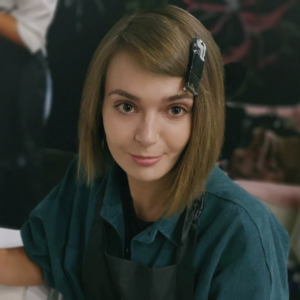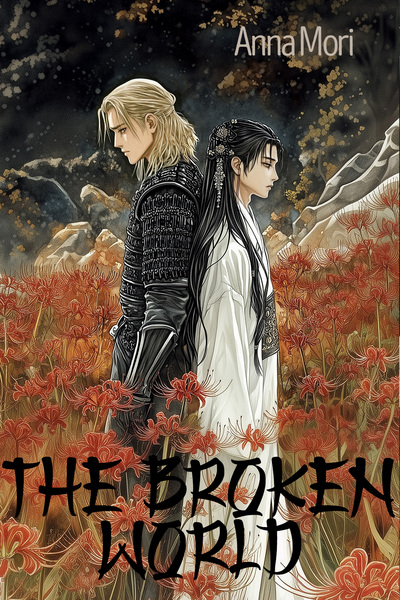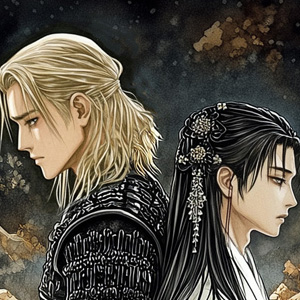He imagined dragons could indeed live in Shinju — this windswept, damp, venomous city clearly not meant for humans. But they wouldn’t be the vivid, fiery dragons he had once envisioned and sketched. No, they would be silvery, like strands of rain, or murky green, like the sea, or leaden gray, the color of solitude and storm clouds before a downpour. Or black, like well water.
The fog in his mind thickened, and his imagination played strange tricks on him. At times, he thought he saw them: shadowy forms gliding through the canals like seaweed, glimmers of scales... These dragons were not benevolent; they frightened him. He would have been glad to forget them, but reminders lurked everywhere — in sculptures, on clothing, dishes, and paintings. The Emperor’s throne was the Dragon Throne, his face was the Dragon Face. When speaking of a deceased emperor, people said he had ridden a dragon to the heavens.
The religious people of Ryukoku truly believed the imperial family were descendants of a god. But Yukinari, albeit with shaky certainty, knew better. Living in Baijing, he had learned that the Great Dragon didn’t exist — educated Yuiguians regarded belief in the Four Gods with a touch of irony.
Yet whether he believed it or not, Yukinari was now a descendant of the Great Dragon and heir to the throne. A throne in a defeated, impoverished, ruined country — but still, he had never seen such grandeur as he found at the Ryukoku court. There were endless rules, conventions, and ceremonies — how to dress, when to speak, when to remain silent. He memorized them all quickly and easily, treating them like a game or a ritual.
New tutors were assigned to him and his brother, and Yukinari threw himself into his studies more fervently than ever, staying up past midnight with books. There was so much to learn about the country that was now his home. And yet, he didn’t fully understand why he was doing it. Once, his small, childish rituals had been aimed at making friends, irrational and incomprehensible though they seemed to others. But the courtly rituals he performed here had no such purpose. There was no one at the Ryukoku court whom he could or wanted to call a friend.
He mastered court etiquette simply to attract less attention. All he wanted now was to become as invisible as possible, to be forgotten. Thoughts of his own unreality, which had once frightened him, now offered a strange kind of hope. He realized there was more alienation in the reverence surrounding him here than in the indifference he had faced in Yuigui. How foolish he had been to think himself lonely before! Now he truly understood what it meant to be alone.
He could go a week without speaking — not out of reluctance but because there was simply no one to exchange even a word with, aside from his tutors.
Though he now lived in the real Ryukoku, the imaginary Ryukoku remained alive in his mind.
His growing isolation in Shinju drove him to invent new friends. In his imagined Dragon Kingdom, he still had one best friend (he believed one was enough — finding that one person destined for you and sharing everything with them, what could be better?), but his vivid imagination wouldn’t let him stop there. He became fascinated with tales of the Strangers, sorcerers from the southern steppes. In Yuigui, they were called yaoguai; here, yokai. He had never seen a Stranger, but they were said to always look strange, unlike ordinary people — perhaps with hair or eyes of any color.
Once, he overheard someone say one of his grandfather’s concubines had Stranger blood. Yukinari found her, but she disappointed him. She wasn’t especially beautiful (though absurdly young compared to the aging emperor), her hair was only slightly less black and straight than most people’s, and nothing else about her seemed unusual.
In his fantasies, though, there were Strangers of every kind: white-haired, red-haired, green-haired; some with wings or scales; people who transformed into wolves or foxes; people who resembled great cats...
His best friend, Dan, could ignite fires with his gaze. (Yukinari wanted his imagined brother and sister to have abilities too but decided they couldn’t be Strangers — they were his family, and he himself was ordinary.)
There was also a boy who could turn invisible —a power Yukinari often envied — and a girl with massive black wings like a raven’s.
There was a girl named Mika, with short, pearl-colored hair like bird feathers, who could stop time.
And there was Fai Faen, the strangest of them all, older than the others. Very tall and thin, with greenish skin, he barely resembled a human. He could speak to flowers and trees, persuading them to grow and bear fruit.
Then there was his fiancée, Lunhe, who could see the future. A fragile girl in black clothing, with enormous, troubled eyes. Her prophecies always came true, but they were rarely happy ones.
Yukinari did wonder if his imaginary friends were replacing real ones, and whether that was wrong. But there was little he could do about it — where would real friends come from?
His mother and sister, Mayumi, now lived on the women’s side of the palace, and he rarely saw them, even if he wanted to. His grandfather, Emperor Yoshihito, seemed kind but took little interest in him — or perhaps he simply had no time for him. In any case, what could a boy and a seventy-year-old man have to talk about?
All Yukinari had was his brother, Yukiyoshi.
The two had never been close. Yukiyoshi wasn’t exactly uncommunicative — he simply didn’t see his elder brother as worthy of interest. He was also cruel and vindictive. In Yuigui, Yukiyoshi had often played mean tricks on other children, clever enough to avoid blame (and most wouldn’t dare complain, knowing his retribution would be harsh). Yukinari had once admired this, thinking his brother was protecting their family. But he eventually realized Yukiyoshi simply enjoyed being cruel.
While others merely avoided Yukinari, they outright hated Yukiyoshi. Yet they still included him in their games, knowing that excluding him would only make things worse.
Of course, Yukiyoshi sensed the falseness in their treatment, knowing that no matter what he did, he would always remain an outsider — a wrong child from a wrong, despised family. This only fueled his anger.
Perhaps he was as lonely as Yukinari, in his own way.
Yukiyoshi took their father’s words about being of the Heavenly Dragon’s blood very seriously. Once, examining Yukinari’s drawings, he asked about the people in them. Yukinari explained they were his friend and fiancée from the Dragon Kingdom, and Yukiyoshi laughed.
“Didn’t Father say the Emperor of the Dragon Kingdom could have a hundred wives? And we’ll have so many friends we won’t be able to count them. Who wouldn’t want to be friends with princes?”
Yukinari sensed something wrong in his brother’s reasoning, but knowing so little about friendship or love, he didn’t dare argue.
The idea of one day claiming his rightful place on the throne lodged itself firmly in Yukiyoshi’s mind. He alone welcomed the move to Ryukoku. Their mother regretted it a thousand times over — she had dreamed of power, only to find herself trapped in the women’s quarters like a caged bird. For Yukinari, little had changed; Mayumi was too young to understand. But Yukiyoshi reveled in their new life.
The fine clothes, exquisite food, the bows and frightened admiration of others — all of it thrilled him. He envisioned himself as the future emperor, the living incarnation of the Dragon on earth, and it showed in his every gesture and word. Only one thing marred his joy: Yukinari, the brother standing between him and the throne.
If Yukiyoshi, not Yukinari, had been the elder, perhaps things might have turned out differently. Perhaps he wouldn’t have carried such bitterness, envy, and hatred...
Or perhaps not.
It all began with a dead dog. Yukinari stumbled across the body in a secluded part of the garden, a spot rarely visited by servants or courtiers but often frequented by him and his brother. The dog, a cheerful, russet-coated Ryokoku breed with narrow eyes, had been cruelly mutilated — its ears and tail cut off, the stumps crusted with dried blood. Someone had tied it to a tree so cleverly that it couldn’t break free or gnaw through the ropes, leaving it to die from wounds, cold, hunger, and thirst.
What shook Yukinari wasn’t just the death itself but the deliberate cruelty behind it— the calculated malice of a mind that had devised such an agonizingly slow death. Worse still, the killer had chosen as their victim not an equal, not someone who could fight back, but a weak, friendly, trusting creature. That betrayal, more than anything, was the vilest part.
He buried the dog. It was winter, and the earth was frozen solid, hard as stone. Using a sturdy branch, he managed to scrape out a shallow grave. When he dragged the dog’s body into it, he realized the hole was too small. Still, he covered it as best he could with clumps of icy dirt and dry leaves. The corpse remained partly exposed, but he decided it was better than leaving it in plain sight.
Yukinari didn’t know for certain who had done this, but he had his suspicions.
He had noticed that Yukiyoshi, his brother, often displayed a streak of cruelty toward the servants. Those who dared defy the prince — or even looked at him the wrong way — paid dearly. Yukiyoshi, it seemed, had realized he no longer needed to hide his impulses as he once had back in Yuigui, where attacks had to be covert. Now, he could indulge his whims openly. For the time being, his victims were limited to household servants and animals, but Yukinari feared it was only a matter of time before he realized he could do far worse.
The dog’s death was followed, not long after, by a human one.
A servant brought Yukiyoshi a cup of lukewarm tea — a grave offense, in the young prince’s eyes. For this crime, Yukiyoshi ordered the man to be flogged with two hundred strokes. Some could survive such a punishment, but this servant did not.
Yukinari was there to witness it. It was the first time either brother had seen death. Yukiyoshi watched intently, his wide eyes devouring every moment, his nostrils flaring as though savoring the smell of blood and sweat.
Yukinari didn’t want to admit it to himself, but from that day on, he feared his brother. And Yukiyoshi had found a new passion: attending public executions. He would stand among the crowd in the marketplace, transfixed by the grim spectacle, his face alight with an unnerving fascination.
When they crossed paths, Yukiyoshi would say nothing, only casting sidelong glances at Yukinari — silent, unreadable, yet undeniably hostile. Those glances unsettled Yukinari deeply. He tried to make conversation, but Yukiyoshi’s curt, dismissive responses made it clear he had no interest in his brother’s company. Eventually, Yukinari began avoiding him altogether, spending more and more time hidden away in the garden, anything to avoid a confrontation.
These events troubled Yukinari, pulling him out of the safety of his fantasies and forcing him to grapple with an unpleasant reality. Yet he had no idea how to fix it.
Before long, every servant in the palace knew of the young prince Yukiyoshi’s terrifying temper. Punishments grew more frequent. Some servants died. Yukinari avoided these scenes, avoiding even thinking about them, but he knew they continued — and the knowledge gnawed at him.
The worst part was how these events began to change Ryukoku — not the real kingdom, but the imaginary one Yukinari had built in his mind.
When he was younger, Ryukoku had been a bright, joyous, magical place, filled with all the wonder and light his real life lacked. But now, the kingdom grew darker. In his imagination, Ryokoku had been invaded by foreign conquerors — inhuman, monstrous invaders. At first, he imagined himself as a hero, a savior of his kingdom, but the situation in Ryukoku grew increasingly dire with each passing day.
Yukinari often blended routine tasks with his imagination, a habit that had started long ago in Yuigui, even before he’d created the world of Ryukoku. For example, he was convinced that the fat, elderly neighbor’s cat was a shape-shifting bakeneko, and he often spied on it, hoping to catch it walking on two legs. The house and garden were alive with marvelous and frightening things others seemed not to notice. He had seen tiny footprints in the ash by the hearth — surely left by a household spirit. Someone invisible rustled ominously among the reeds by the pond. Once, in a snowstorm at dusk, he thought he glimpsed a woman’s silhouette in the distance — perhaps the beautiful Snow Woman, come to befriend him and, one day, become his bride.
After they moved to Ryukoku, he occasionally wondered if he was too old for such games. But without them, his life would have been unbearably dull. So he embraced his fantasies so completely that he hardly recognized them as fantasies anymore. Studying lessons became reconnaissance missions to uncover the enemy’s plans. Jumping over puddles in the spring became wading through marshes on a secret path to an enemy camp. Climbing a tree became flying on the back of a dragon.
One day, while hiding in the garden pavilion to avoid his brother, half-immersed in his imaginary world, a terrible realization struck him. The evil forces invading Ryukoku were being led by Yukiyoshi.
Previously, Yukinari had thought his brother had no place in Ryukoku, but now it all made sense. Yukiyoshi was there, and he was the villain. He was the one destroying the kingdom — it was as clear as day.
Yukinari realized he hated Yukiyoshi. And Yukiyoshi hated him. Perhaps this had been obvious to everyone else for some time, but Yukinari, with his inability to grasp others’ feelings — or even his own — had only just understood it.
But what could he do with this new understanding? He had no idea.
As for the rest of the palace inhabitants, Yukinari had never thought much about them — they had always been strangers to him. But now, when he forced himself to consider his feelings, he realized some of them he liked (a rare few), others he did not, and some reminded him of his imaginary friends from Ryokoku — or at least, he wished he could invite them into his kingdom.
His intimate knowledge of the palace and garden, combined with his knack for moving like a ghost, could have made him an excellent spy, had he cared about court politics. But he didn’t. However, when he accidentally overheard conversations, he did not feel awkward either. Most often, he simply remained indifferent to what he learned from them — most of what he heard had nothing to do with him.
But conversations that concerned him unsettled Yuki, leaving him feeling awkward and uneasy.











Comments (0)
See all